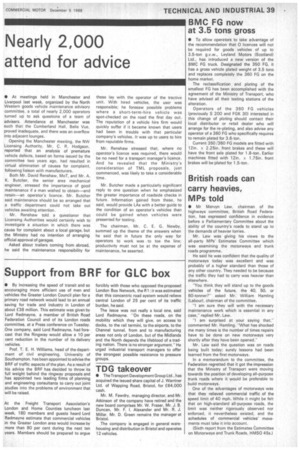Nearly 2,000 attend for advice
Page 41

If you've noticed an error in this article please click here to report it so we can fix it.
• At meetings held in Manchester and Liverpool last week, organized by the North Western goods vehicle maintenance advisory committee, a total of nearly 2.000 operators turned up to ask questions of a team of advisers. Attendance at Manchester was such that the Cumberland Hall. Belle Vue, proved inadequate, and there was an overflow into adjacent lounges.
Opening the Manchester meeting. the NW Licensing Authority, Mr. C. R. Hodgson, reported that an analysis of premature vehicle defects, based on forms issued by the committee two years ago, had resulted in virtual elimination of causes for complaint, following liaison with manufacturers.
Both Mr. David Renshaw, MoT, and Mr. A. K. Butcher, the senior area mechanical engineer, stressed the importance of good maintenance if a man wished to obtain—and retain—an operator's licence. Mr. Butcher said maintenance should be so arranged that a traffic department could not take out vehicles awaiting attention.
Mr. Renshaw told a questioner that Licensing Authorities would certainly wish to investigate a situation in which there was cause for complaint about a local garage, but the Ministry had no intention of arranging official approval of garages.
Asked about trailers coming from abroad, he said the maintenance responsibility for these lay with the operator of the tractive unit. With hired vehicles, the user was responsible; he foresaw possible problems where a short-term-hire vehicle was spot-checked on the road the first day out. The reputation of a vehicle hire firm would quickly suffer if it became known that users had been in trouble with that particular company's vehicles. It was up to users to hire from reputable firms.
Mr. Renshaw stressed that, where no operator's licence was required, there would be no need for a transport manager's licence. And he revealed that the Ministry's consideration of TM L proposals, just commenced, was likely to take a considerable time, Mr. Butcher made a particularly significant reply to one question when he emphasized the greater importance of roadside checks in future. Information gained from these. he said, would provide LAs with a better guide to the condition of an operator's vehicles than could be gained when vehicles were presented for testing.
The chairman, Mr. C. E. G. Newby, summed up the theme of the answers when he said that in future the only way for operators to work was to toe the line; productivity must not be at the expense of maintenance, he asserted.






















































































































































